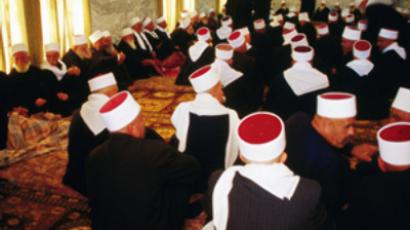Ukraine puts journalist on trial for viewpoint
A journalist is due to go on trial in Ukraine for challenging the official view of the 1930s famine in the country.
The editor-in-chief of the eastern Ukrainian Rodnoe Priazovye newspaper Sergey Shvedko will have to defend his reputation in court after his article caused outrage with the local bureau of the presidential Our Ukraine party.
In the article, Shvedko openly questioned the stance of today’s leadership in Kiev, which argues that the Soviet famine in the 1930s was genocide against the Ukrainian people.
“I fully agree – that famine rocked many parts of the Soviet Union, and that it was caused by the criminal negligence of the country’s leadership at that time,” Shvedko said. “What I don’t agree with is it was directed solely against Ukrainians. I base my thinking on international law and historic facts.”
A month ago RT brought you the story of political analyst Viktor Pirozhenko, who also suffered scrutiny from the authorities for making the same argument.
Ukraine’s security service, the SBU, declared that his articles threatened national security and launched probes into his work.
“These articles essentially contained no calls for separatism, terrorism or support of any destructive groups,” Pirozhenko said. “It was just a compilation of facts. So I can only wonder what I’ve done wrong.”
It happened more than seven decades ago, but in modern-day Ukraine, the tragic famine of 1932-33 has been sending shockwaves across the country for many years.
Kiev insists the death toll exceeded 10 million people and that it was an attempt at wiping out the entire Ukrainian nation. The majority of historians counter the idea, quoting facts that many other parts of the Soviet Union were also affected.
The president of the Historical Perspective Foundation in Moscow Natalya Narochnitskaya says it was the soviet peasantry who were the target of the famine, not the Ukrainian people.
“The famine in Ukraine is now used as an instrument for falsifying history. Of course there was a tragedy, people died of the famine, because of the class struggle instigated by the Bolshevik regime. But there was no ethnic component, the repressions were aimed at conservative circles in the peasantry,” Narochnitskaya says.
Kazakhstan lost almost a third of its population, and Russia’s Volga region also suffered huge fatalities.
But it’s only in Ukraine where the issue of famine has been something of a campaign for the last five years.
Outgoing Ukrainian president Viktor Yushchenko spared no time or effort to have the 1930s famine recognized as genocide against Ukrainians. Apart from introducing a law that provided for criminal punishment for denouncing the events as a crime against humanity, he also spent millions of dollars on monuments across the country.
Analyst Vladimir Kornilov from the Ukrainian branch of the Institute for CIS Countries, which has also been pressured by the authorities, says the perception of the 1930s famine underlines an ideological schism in Ukraine.
“The strong nationalistic push made by Yushchenko in fact created a counter-push,” Kornilov said. “While ultra-nationalist movements have been developing rapidly in the west of Ukraine under his protectorate, groups of completely opposite views got stronger in the east. These are separate groups, and any idea that could unite them is what the authorities fear the most. That’s why they use such repressions.”
Shvedko doesn’t yet know what awaits him in the courtroom. Pirozhenko says that the authorities have backed away from his case for now.
But both are anxious to know what stance the country’s new president will take on historic issues, once he or she takes the helm in three weeks’ time.













